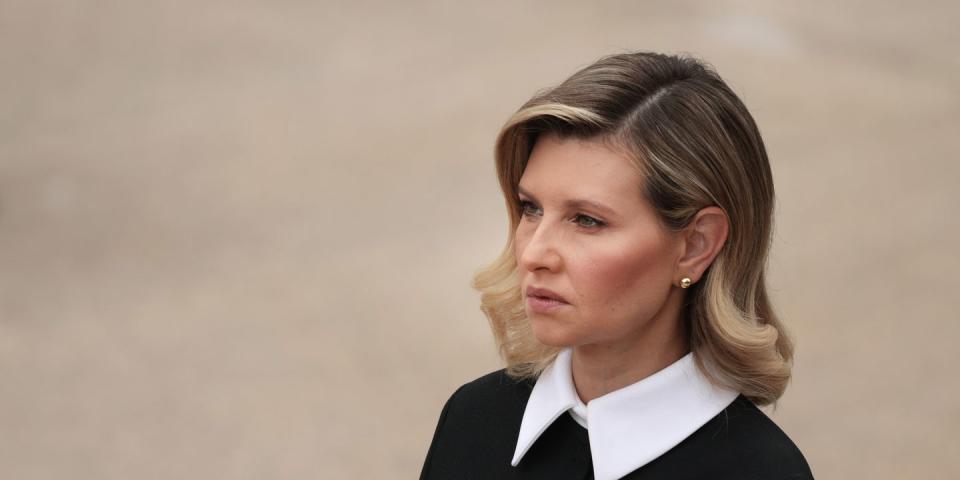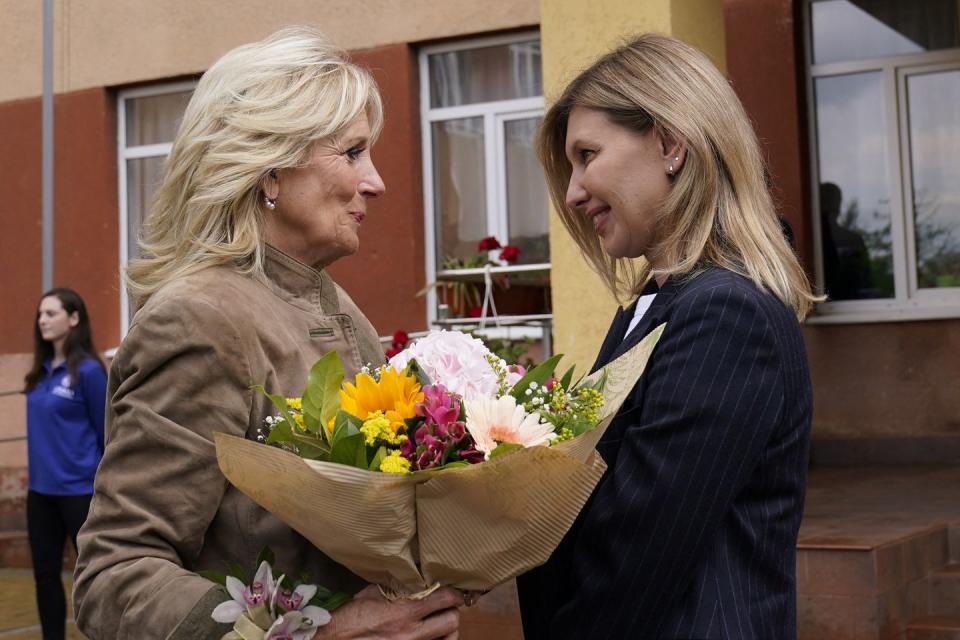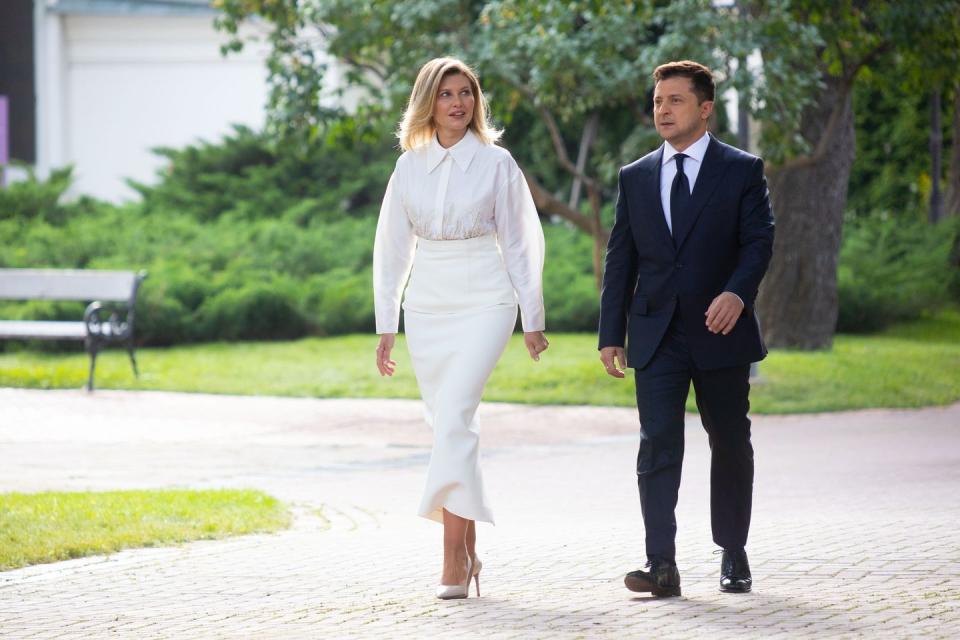An Interview With Olena Zelenska, Ukraine’s First Lady
- Oops!Something went wrong.Please try again later.

The below interview first appeared in ELLE Poland, and has been translated into English.
ELLE: How did war affect your everyday life, and what does your life look like now?
Olena Zelenska: Everyday life is no longer measured by time periods. There are no long-term plans. We live today. Today we are doing everything in our power to ensure that this day does not pass in vain. Every day I follow my two main responsibilities. The first is to be the wife of the President and work with the media doing interviews and humanitarian projects. The work should not stop, especially now.
The second is to be a mother. It has been two months since I have been "working" as a teacher for my son. Due to the strict security requirements, we can't even join online classes with him. That's why I find out what his classmates went through today, and we do the same with him. Ukrainian, English, Mathematics… Fortunately, at the level of the third grade I can still teach something. We have a clear schedule. This, to be honest, helps me to be more collected and does not leave much time for anxious thoughts.
What questions from your children were the most difficult to answer recently? And what questions do you ask yourself? Do you find answers?
There is one main question that everyone, both adults and children, wants to be answered. “When will the war end?” We even stopped asking each other about it… We just keep hope. We all do. We all hope.
Related video: How to help people in Ukraine right now
You keep the spirit of Ukrainians alive through the social media. Who is keeping your spirit alive? What gives you strength?
In our country, since the war, everyone holds the spirit of everyone. We are like a living chain where you hold someone’s hand and someone holds yours. First of all, it’s family and friends. But there are often strangers. You see how fighters, in any weather conditions and time of the day, stand at checkpoints. How restaurateurs deliver food to the elderly in every city. How Kyivans and internally displaced persons, they deliver humanitarian aid to the inhabitants of the destroyed Kyiv and Chernihiv regions. When you read the news and see how hundreds of people in different parts of the country or even the world make other people in Ukraine get medicine and treatment, it’s all inspiring. I have inspiring colleagues—the first ladies of the world, with whom we have made the transportation of Ukrainian children with serious illnesses work. These children are inspiring, who have just come out of the bomb shelters, and they smile and encourage their own parents. The Armed Forces inspire with their every success. I would say - if you need strength and inspiration now, if someone is not inspired - then go to Ukraine! We have enough for everyone.
You have succeeded in organizing medical transports for Ukrainian children. We can see on your Instagram heartbreaking pictures of small children and teenagers, innocent victims. Almost two hundred children died. Do you think that the current international help is sufficient?
Maybe I’ll say it harshly now. But I’ve said it before in various manners. On the 50th day of the war I have run out of soft words. The best help for the children of Ukraine is to close the sky over Ukraine so that bombs do not fall on them!
Most of the dead died from Russian bombs, missiles, and their wreckage. The number of injured children who lost their arms and legs is already in the hundreds.
But the sky is not closed. What else can I say?
Since it is so dangerous in Ukraine that any city and neighborhood is in the zone of hostile attack, we are doing what we can to transport children with oncology, other serious conditions, orphans abroad.
Now this route (convoy of life, we call it) runs through Lviv to Poland. From there the children are transferred to European countries. It saves lives. But this is not enough. After all, even when these children are in Lviv waiting for a bus to Poland, no one can guarantee that the next Russian missile will not hit. But the needs of our children do not end with evacuation to safety. The stage of adaptation in a new country is waiting for them. And help with adaptation is also one of the most important questions and requests. I addressed my colleagues—the first ladies of the world—and through them, the state institutions of these countries, asking to help Ukrainian children to continue the educational process, to have access to medical care. I am grateful to all my colleagues who actively responded and contributed to the rapid adaptation and return to normal life of young Ukrainians.

I asked previously about strength, because in the face of Russian war crimes in such cities like Bucha and Borodzianka, a lot of people have a feeling of helplessness. Does this feeling accompany you often? Or have you managed to work out other types of reactions?
My compatriots, I see it in the letters and stories of relatives, now often complain about the “guilt of the survivor.” This is typical for very sensitive, empathetic people who feel the pain of others as their own, who find it difficult to be safe if someone dies.
Without exaggeration, this is our problem now, because we all feel like one organism, one family, and every pain is not someone’s else’s it is ours.
But hundreds of psychologists are now writing that it is not right to immerse yourself in this feeling. It is not constructive.
And the best cure for this is to do what you can. You can fight , fight. You can make sandwiches for refugees. You can provide a room in the apartment, whatever your contribution.
Thus, helplessness disappears where there is even a small step.
Could you pick one picture which symbolizes this war in your opinion?
Every day the war shows us so many terrible pictures that our hearts are torn. Probably you have seen photos from Bucha: a little boy on the grave of his dead mother in his own backyard.
Or a photo of rescuers dismantling a building in Borodyanka destroyed by an air bomb, and a local woman, an elderly woman, sitting next to them on a chair, waiting for the bodies of her loved ones, probably they are there, under the stones… But I’ll name another photo. It is also from the town of Borodyanka. There on the wall of the ruined kitchen, at a height of several floors, remained hanging kitchen cabinet. And on it - a clay rooster-pitcher. By the way, this is a well-known work of the Ukrainian artist of the last century Prokop Bidasyuk, in many families there was such a pitcher. This photo has become a meme - it is now being distributed with the caption “We all need to behave like this kitchen cabinet and this rooster.” Recently, such a rooster was presented to my husband - just on the street when he was showing the capital of the British Prime Minister Boris Johnson. By the way, at least one piece of good news: the owner of the cabinet and the rooster was found in the evacuation in the West of Ukraine. She is okay, or as much as she can be, having lost all property.
Both you and your husband were born in Krzywy Rog. Could you share with us your memory connected to this city?
For us, Kryvyi Rih is the city where we grew up. It has always been a city of active people, active youth. That’s how I remember it. I hope it is the same now. Maybe someone may consider our city a province, but the Kryvyi Rih people never felt provincial. We always feel confident, everywhere.
What is your association with Ukraine (place, taste, maybe smell?)
If it's the taste, then dumplings with cherries. The time of year is summer. Place - any place in my homeland.

Among the heartbreaking images there are also a lot of memes and jokes provoking sympathy for the Ukrainian people, like farmers hauling tanks. Do you think that sense of humor could be a weapon against dictators like Putin?
You know, as a person whose profession relates to humor, I have a great respect for the outstanding Polish writer Stanislaw Jerzy Lec. He was born in Lviv. During the war he was in opposition. In the concentration camp, where he was able to escape. Was it an easy life? No. But he found the strength to be and remain a humorist, a satirist. He filled humor with a philosophical meaning. He said “humor is when the scary becomes funny.” So, I will add - humor overcomes fear. This is unambiguous. Everyone in Ukraine knows the phrase “We laugh, so we do not give up.” That’s right.
Tell us about the simple things from your life you miss most.
I miss a simple life without the daily question “what will be tomorrow?”. I miss our dinners with my family. Children fool around, we laugh… When we all are together…
If you could finish the famous sentence of Martin Luther King, "I had a dream,” what would it be?
I wish all Ukrainians were alive. That every child, every adult met our victory. Because what is destroyed will be rebuilt. The country is not about buildings or resources, it is about people.
I dream of life and peace for everyone of us.
You Might Also Like

